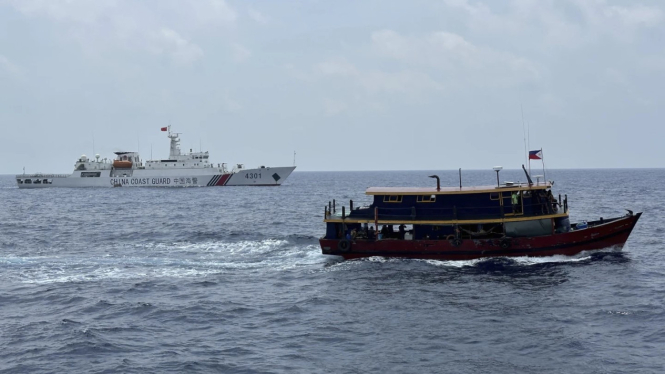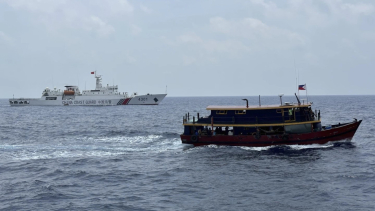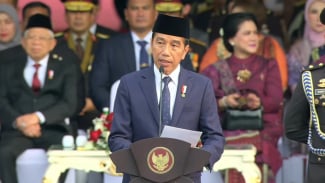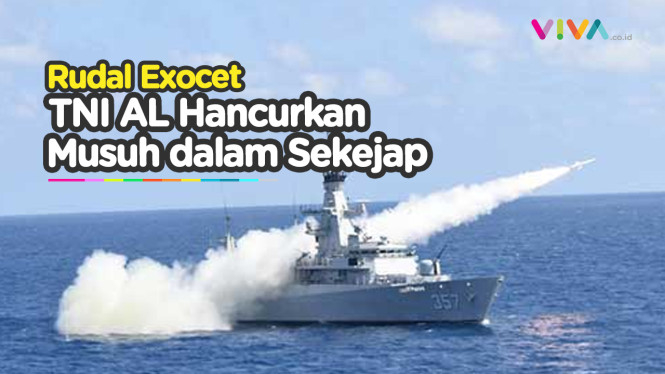Chinese Aggression and Maritime Security in the South China Sea
- AP Photo/Joeal Calupitan.
VIVA – Chinese aggression in the South China Sea has become a global focal point, particularly regarding its territorial claims involving several neighboring countries such as the Philippines, Vietnam, and Malaysia. China claims almost the entire South China Sea based on the "nine-dash line," although these claims are not recognized by international law, including the United Nations Convention on the Law of the Sea (UNCLOS).
China's aggressive actions include constructing artificial islands, deploying military forces, and enforcing its claims in ways often deemed provocative, such as interfering with vessels from other countries operating within their exclusive economic zones (EEZs).
The Philippines, as one of the most affected countries, has issued warnings to China regarding the actions of its coast guard, which are considered dangerous. President Ferdinand Marcos Jr. has asserted that the Philippines will not back down in defending its maritime sovereignty, although efforts to de-escalate tensions continue. He stated that the Philippines' actions would be proportional and that the country does not seek a larger conflict.
Other countries in the region, like Indonesia and Malaysia, are also feeling the impact of China's aggression. Although Indonesia does not have direct claims in the South China Sea, it consistently emphasizes that all claims must align with UNCLOS.
Komodor Jay T Tarriela hadir secara daring pada diskusi Universitas Paramadina
- VIVA/Ainuni Rahmita
China's continued incursions into the exclusive economic zones of other countries raise concerns about potential future conflicts, given the importance of these waterways for global trade and natural resources. Consequently, Paramadina University hosted a discussion titled "China and Maritime Security in the South China Sea: Indonesian and Philippine Perspectives" in collaboration with the Indonesian Sinology Forum on Thursday, July 25, 2024.
The discussion featured various speakers, including Commodore Jay Tristan Tarriela, who currently serves as Chief of Staff for Human Resource Management (CG-1) of the Philippine Coast Guard, Advisor to the Commander on Maritime Security Affairs, and Spokesperson for the Philippine Coast Guard in the West Philippine Sea.
Representing Indonesia were Rear Admiral Eka Satari, Director of Cooperations of the Indonesian Maritime Security Agency (Bakamla RI), Dr. Mohammad Riza Widyarsa, a lecturer in International Relations at Paramadina University, and Johanes Herlijanto, Chair of the Indonesian Sinology Forum.
Johannes suggested that the strategy employed by the Philippines in response to China's aggressive actions serves as a valuable lesson for other countries facing similar experiences. He noted that China's aggressive stance is evident through tactics known as "grey zone" strategies against countries with sovereignty or sovereign rights in waters that China claims as its own.
"In reality, China's assertion of ownership, based solely on historical claims, contradicts international maritime law, particularly the UNCLOS, which China itself has ratified," he said.
Johannes highlighted that China's unilateral recognition, marked by the nine-dash line, was actually refuted by the ruling of the International Arbitration Tribunal, brought by the Philippines in 2016.
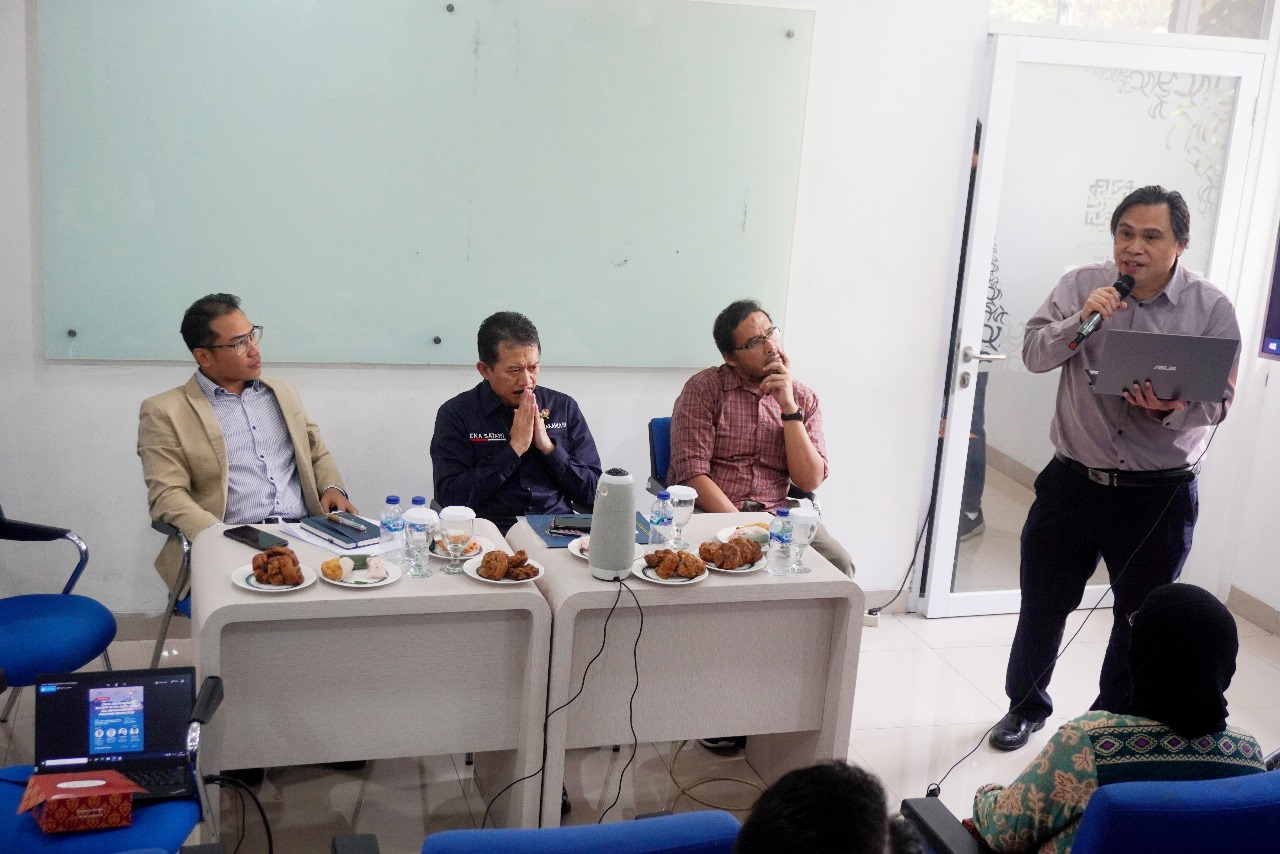
However, the country not only insists that much of the South China Sea (SCS) belongs to it but also continues to employ grey zone tactics. The Philippines has been a target, especially in the last two or three years. Johannes reminded that besides the Philippines, Vietnam and even Indonesia have frequently been targets of China's grey zone activities.
Jay Tarriela pointed out that President Marcos decided to adopt a strategy of transparency after considering the strategies of previous presidents. The Philippine President wants to disclose and publicize China's activities in the area to the Filipino people and other countries as part of his foreign policy.
"Based on reflections on the strategies adopted by previous presidents, President Marcos decided to implement a strategy of transparency, essentially a strategy to expose China's aggressive actions in the Philippine EEZ," said Commodore Jay.
This transparency strategy is supported by law enforcement agencies, media monitoring patrols, and the Filipino public as a whole. They unite in supporting the government against China's aggression. Nonetheless, Commodore Jay expressed the importance of the Philippines also receiving support from other Southeast Asian countries.
"Countries in the region must also expose China's aggressive actions, as countries in the region, such as Indonesia, Malaysia, and even Vietnam, have been targets of these aggressive actions," he added.
Commodore Jay's statements align with the views of Rear Admiral Eka Satari, who emphasized the importance of cooperation among international law enforcement. Eka stated that no country can handle maritime issues alone, making international cooperation crucial. He cited the ASEAN Coast Guard Forum, initiated in 2022, as an example of tangible cooperation. This forum aims to enhance collaboration in capacity building, maritime patrols, and operations among ASEAN coast guards.
Mohammad Riza Widyarsa also argued that collaboration among countries with similar interests, such as Indonesia and the Philippines, can curb China's aggressive behavior in the South China Sea.
"Cooperation among countries in the region is very important and effective, especially when a swift response is needed," said Riza.
The discussion concluded with the call for ASEAN countries not to remain passive in the face of China's aggression in the South China Sea. Staying silent would only encourage China to be more aggressive and pressure countries with territorial disputes in the region.

